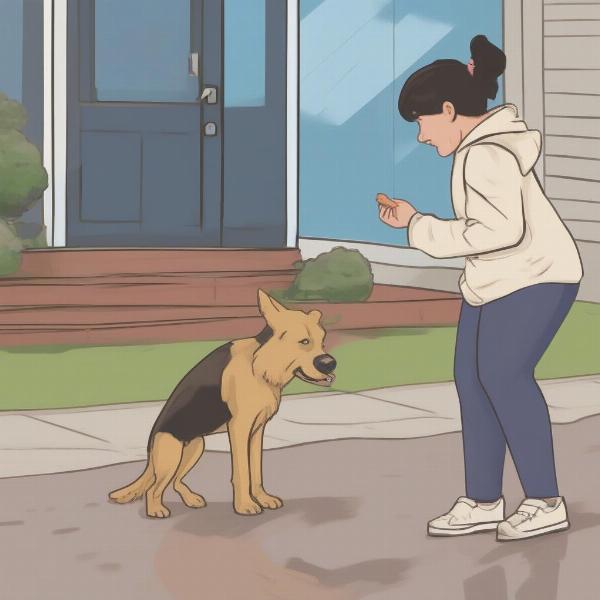Dealing with dog urine on your carpet can be a frustrating experience. The smell is unpleasant, and the stain can be difficult to remove. This guide provides practical, reliable advice on how to stop your dog from urinating on your carpet, covering everything from identifying the underlying cause to implementing effective training and cleaning strategies.
Understanding Why Your Dog Urinates on the Carpet
Before you can address the issue, it’s crucial to understand why your dog is urinating on the carpet. Several factors can contribute to this behavior:
- Medical Reasons: Urinary tract infections, bladder stones, incontinence, diabetes, and kidney disease can all cause increased urination and difficulty controlling bladder function. If your dog suddenly starts urinating inappropriately, a vet visit is essential to rule out medical problems.
- Behavioral Issues: Anxiety, fear, submissive urination, territorial marking, and excitement can all lead to inappropriate urination. Changes in the household, such as a new pet or family member, can also trigger this behavior.
- Incomplete House Training: Puppies and newly adopted dogs may simply not be fully house-trained yet. Consistent training and reinforcement are key in these cases.
- Substrate Preference: Some dogs develop a preference for certain surfaces, like carpet, especially if they’ve had accidents on them before. The carpet may retain the scent of urine, even after cleaning, encouraging repeat offenses.
Effective Strategies to Stop Carpet Urination
Once you’ve identified the potential cause, you can begin implementing strategies to stop the behavior. Here are some effective methods:
- Consult Your Veterinarian: This is the first and most important step, especially if you suspect a medical issue. Your vet can diagnose any underlying conditions and recommend appropriate treatment.
- Reinforce House Training: Take your dog outside frequently, especially after waking up, eating, and playing. Praise and reward them when they urinate outside. Use a consistent command, such as “go potty,” to associate the action with the desired behavior.
- Clean Accidents Thoroughly: Use an enzymatic cleaner specifically designed for pet urine to eliminate the odor completely. Regular cleaning products often mask the smell to humans but are still detectable by dogs.
- Manage Anxiety and Stress: If anxiety is a factor, identify and address the source of stress. Create a safe and comfortable environment for your dog. Consider using calming aids, such as pheromone diffusers or calming supplements, in consultation with your vet.
- Confine Your Dog: When you can’t supervise your dog, confine them to a crate or a small, easy-to-clean area. This prevents accidents and helps reinforce house training.
Preventing Future Accidents
Preventing future accidents requires a proactive approach. Here are some tips:
- Establish a Routine: A consistent feeding, walking, and playtime schedule helps regulate your dog’s bladder and reduces the likelihood of accidents.
- Increase Water Intake (if medically appropriate): Encourage your dog to drink plenty of water, which can dilute their urine and help flush out their urinary tract. However, always consult your vet before significantly altering your dog’s water intake, especially if they have any underlying medical conditions.
- Limit Access to Carpeted Areas: Use baby gates or close doors to restrict your dog’s access to carpeted areas until they are reliably house-trained.
- Positive Reinforcement: Continue to reward your dog for urinating outside, even after the problem seems resolved. This reinforces the desired behavior and helps prevent regressions.
- Professional Help: If you’re struggling to address the issue on your own, consider consulting a certified professional dog trainer or a veterinary behaviorist. They can provide personalized guidance and develop a tailored training plan.
 Dog Urinating Outside – Positive Reinforcement
Dog Urinating Outside – Positive Reinforcement
Conclusion
Stopping a dog from urinating on the carpet requires patience, consistency, and a thorough understanding of the underlying cause. By addressing both the behavioral and potential medical aspects of the issue, and by implementing preventative measures, you can create a clean and harmonious environment for both you and your furry friend. Remember to consult your veterinarian for guidance and to rule out any medical conditions.
FAQ
- How long does it take to house-train a dog? It varies depending on the dog’s age, breed, and previous experiences, but it can take several weeks to several months.
- What is the best way to clean dog urine from carpet? Use an enzymatic cleaner specifically designed for pet urine.
- Can stress cause a dog to urinate inappropriately? Yes, anxiety and stress can trigger inappropriate urination.
- Should I punish my dog for urinating on the carpet? No, punishment is ineffective and can worsen the problem. Focus on positive reinforcement instead.
- When should I consult a vet about my dog’s urination issues? If the behavior is sudden, frequent, or accompanied by other symptoms, consult your vet immediately.
- What are some common medical reasons for inappropriate urination? Urinary tract infections, bladder stones, incontinence, diabetes, and kidney disease.
- How can I prevent my dog from developing a substrate preference for carpet? Clean accidents thoroughly with an enzymatic cleaner and restrict access to carpeted areas until the dog is reliably house-trained.
ILM Dog is a leading international online resource dedicated to providing expert advice and practical information on all aspects of dog care and wellbeing. From breed selection and puppy care to senior dog health and training tips, we offer a comprehensive range of resources to help you provide the best possible care for your canine companion. Our expertise spans across key areas such as dog breeds, health, training, nutrition, grooming, and accessories. For any questions or concerns, feel free to contact us at [email protected] or call us at +44 20-3965-8624. Visit ILM Dog for more helpful resources and expert advice.